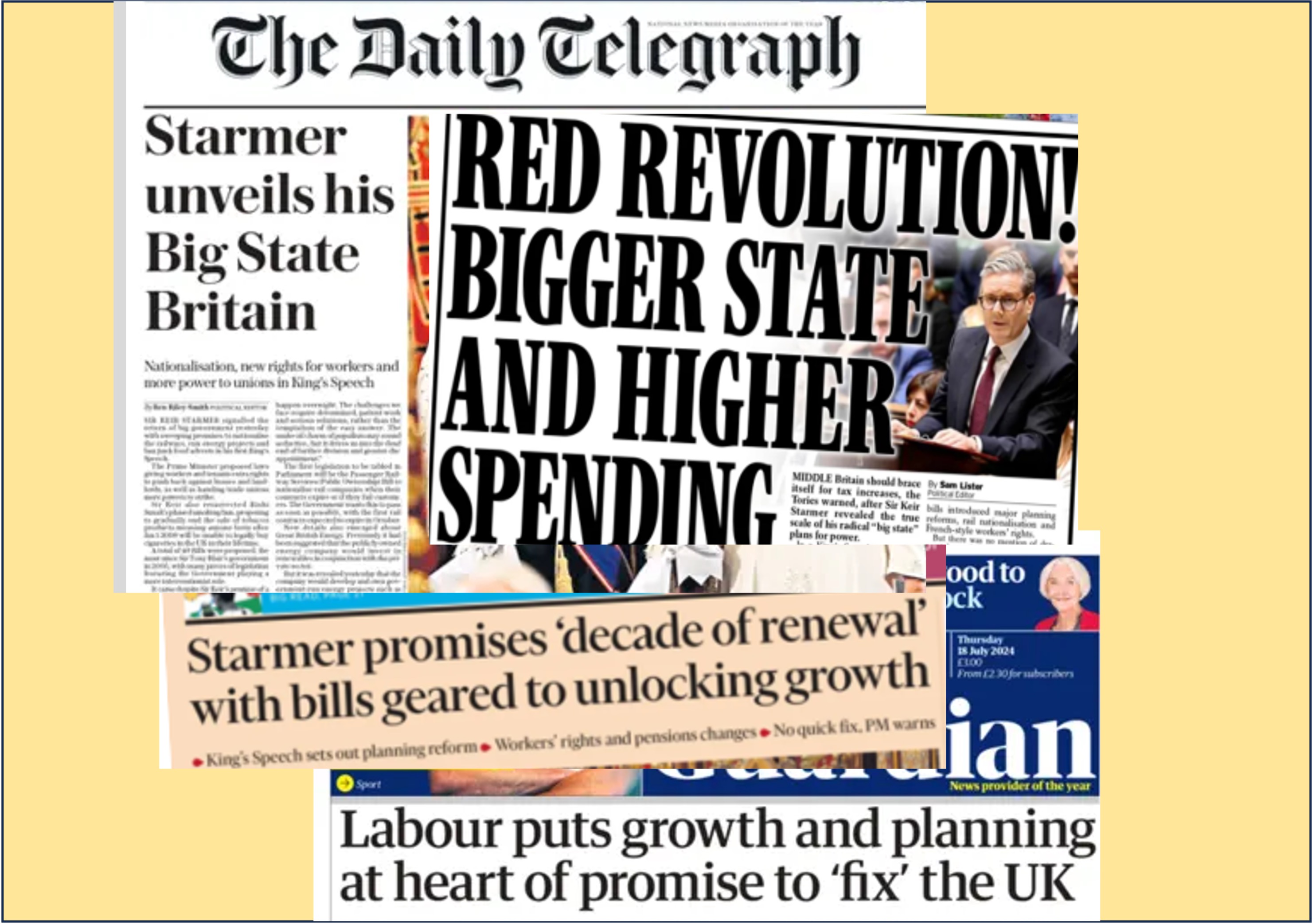This is Blog No 75
Reflecting on this week’s King’s Speech and reading the not-very-detailed Background Briefing, one is struck by the sheer scale of what the new Labour Government is hoping to do.
If its Election strategy was “under-promise then over-deliver”, this cannot be said for a gargantuan legislative programme that is optimistic in the extreme.

It is not that a party with a thumping majority cannot force through pretty well everything in the division lobbies. It is the underlying complexity of the ‘wicked issues’ they are tackling, and the constraints of a weakened civil service and the shortage of experienced parliamentary draftspeople. In addition, the processes of Parliament are themselves less flexible than many imagine. It’s not surprising that the King’s speech included a proposal to set up “a modernisation committee of the House of Commons which will be tasked with driving up standards, improving work practices and reforming procedures.” Good luck!
This is a Government in a hurry. It needs to demonstrate change as fast as possible. Time is the enemy. Get on with it!
Speed … everywhere
Which brings us to planning, the aggressive statements made by the PM and his colleagues. and the suggestion that war is about to be declared on NIMBYs. These words may well have originally been intended to forewarn Conservative MPs in rural English counties; ironically now many are represented by LibDem and Labour members. We are still largely in the dark as to how exactly the proposed Planning and Infrastructure Bill will change the system, but no matter – we all get the message. Councils are saying No too often, and too slowly.
The Government will wish to ‘streamline’ the process. At some point they will surely alight on the delays caused by various consultations – whether relating to the formulation and adoption of a local plan, or in determining specific applications in the development control process. Everything takes too long. Many developers, of course , hate consultation for they only hear from those who oppose their plans. They would like a regime such as Robert Jenrick’s attempt to move to a ‘zonal’ scheme, whereby once designated, Councils could not refuse permission, no matter how unsuitable the planning application might be. At my local village, residents are considering whether to allow the building of some ‘executive bungalows’ costing about £1.2m each – when the need is sorely felt for affordable starter homes for young people. The build-housing-quickly lobby would dearly love to remove these residents’ right to be consulted as to what is built.
Beyond planning, the King’s Speech will trigger a large number of consultations which will frustrate Ministers who already think they know exactly what to do. In Blog 74, I considered why they should still prioritise consultations.
But is there maybe a case for making them quicker?
The traditional timescale has become known as the ‘twelve-week rule’ – a sensible process that originated in the local authorities pre-1999 quarterly committee system. It still has many supporters especially in the voluntary and communities sector. But it has long been overtaken by a loose anything-goes regime – ever since the Coalition Government’s Consultation Principles replaced the excellent 2008 Code of Practice.
Many complex consultations, involving a vast range of stakeholders and raising questions not previously addressed by consultees, justify a longer duration. But not all. With social media, email, mobile devices and all else, it is perfectly possible to hold short but effective consultations – always ensuring that we do not deprive affected communities – or communities of interest – of the opportunity to express themselves. Effective engagement with key stakeholders can also enable shorter consultations. But as recently highlighted in the LIBERTY v Home Secretary case, there is a temptation only to talk to the stakeholders that agree with you. Public bodies can see the pitfalls; better go easy on pre-consultation – and stick with the old-fashioned twelve-week rule!
Consultations can, however, be accelerated simply by better forward-planning and maybe by being more realistic about the information that is deemed necessary to publish. In the NHS, I recently saw an Outline Business Case for modest improvements in GP services for a small town, at a cost below £1m. It was a largely-unreadable 100+ page document written by well-paid technocrats and probably absorbed only by those of a similar background. Tick in the box? We sometimes make consultations more complicated than they need to be.
The problem is most acute in the tangle of documents required of large infrastructure projects. Any delays caused by consultation are dwarfed by the time it takes to research and document environmental impact assessments, a situation aggravated by the recent Finch v Surrey judgment in the Supreme Court. This and other burdens have been imposed by well-meaning politicians who believe that net zero is easier to accomplish if we place hurdles in the way of saying yes to too many projects and then regret it. To meet its housing and infrastructure goals, Labour – alongside the planning profession - needs to find ways to streamline the entire process – and not focus on restricting consultation.
There is another way to speed up the process. The Gunning Three principle is about providing enough time for ‘consideration and response’, and all of a sudden, ArtificiaI Intelligence or AI offers the opportunity to accelerate analysis considerably. By coincidence, earlier this week, the Government published a Press Release boasting how the Actuarial office had successful used AI to analyse half-a million words in a consultation. And no doubt it works. Yes we can do things QUICKER.
What we must avoid is doing things WORSE. Restricting people’s right to be consulted will aggravate their sense of what is fair and will lead to worse outcomes. If Labour is sensitive to its electorate, it will accept the need to consult – if necessary – quicker. A fast-track four week standard possibly for some categories of consultation?